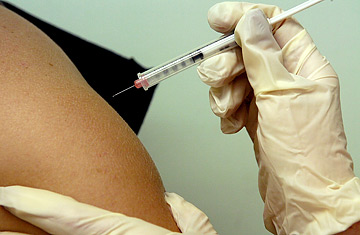
A patient receives an HPV vaccine.
It's hard to ignore the letters H-P-V in a headline. Much has been written about HPV, or human papillomavirus, which infects some 20 million people in the U.S. and causes cervical cancer and genital warts. Even more has been written about the HPV vaccine, Gardasil, which was approved by the government last summer and is widely recommended for girls and women aged 11 to 26. But many consumers still have questions: for starters, can the vaccine help women who are already infected? Can it help older women over the age of 26? And can it do anything for boys and men?
A new study in the Aug. 15 issue of the Journal of the American Medical Association aims to clear up at least some of that uncertainty. Dr. Allan Hildesheim, an epidemiologist at the National Cancer Institute, and his colleagues set out to determine whether Cervarix — a new HPV vaccine for which GlaxoSmithKline hopes to get federal approval in early 2008 — could help reduce the virus-load in women already infected with HPV. According to the study's authors, past trials have suggested that HPV vaccination boosts the body's immune response to infection, and some researchers thought that it might work as a form of therapy for HPV-positive women. Like its cousin, Gardasil (Merck), Cervarix is designed to protect against HPV virus types 16 and 18, which together cause 70% of all cervical cancers. But Hidesheim's study of more than 2,100 women aged 18 to 25 in Costa Rica found that Cervarix — like Gardasil — doesn't fight HPV or change the progression of cervical cancer in patients who already have it, confirming that the vaccines are as they have been touted from the start: preventive, not therapeutic, measures.
"There was a lot of confusion in the clinical and lay communities around the use of the vaccine in individuals already infected," says Hildesheim. He says that he and his team are "trying to fill the void" left by publications that haven't addressed patients' questions about whether the vaccine can be used to treat infection. "We wanted to make it clear. The vaccine is not therapeutic," he says. "[The study] reinforces the greater utility of vaccinating young and adolescent girls before they initiate sexual activity because that's how you get the most benefit from this vaccine."
Gardasil protects against four strains of HPV: 6 and 11, which cause genital warts, and 16 and 18, which cause cancer. It makes sense for young women to get vaccinated before exposure to any of these strains. But should they still get vaccinated if they have already acquired one or two of the strains — especially the ones that cause cancer — but not the others? The answer might appear to be yes, but Hildesheim says the issue is still unsettled. "Once sexual debut occurs, the less the benefit of the vaccine will be," he says, pointing to the fact that the risk of HPV exposure jumps once a person is sexually active. "How much less and whether vaccination is warranted after sexual debut, I think the data aren't there yet to support taking the vaccine or not." It will take additional research to see what the "residual benefit" will be.
In the U.S., the District of Columbia and the state of Virginia have passed mandatory-vaccination laws in order to cut down on some of the 5.5 million new HPV infections each year nationwide. At least half of all sexually active men and women will get HPV during their lifetime, though about 90% of HPV infections clear naturally within two years. But the virus is more critical for women, 80% of whom will have had an infection by the time they reach 50. Recurrent infections can lead to cervical cancer, of which there are 12,200 new cases each year, resulting in 4,100 deaths in the U.S.
The field of HPV vaccine research is still in its earliest stages. Studies have only just begun on the safety of the vaccine in women older than 26. And, according to GlaxoSmithKline spokeswoman Liad Diamond, studying Cervarix in boys and men is "on the radar screen of the clinical development team" but there is "nothing underway right now." At Merck, clinical trials of Gardasil in males have been ongoing for about a year, and preliminary results show that "immune responses in 9- to 15-year-old boys are consistent with those found in females aged 16 to 23," according to Merck's Kelley Dougherty. Once efficacy data are available, Merck expects to submit applications to the Food and Drug Administration and other regulatory bodies for approval of the vaccine in young men.
A study published last May in the New England Journal of Medicine showed that HPV infection increases men's risk of certain kinds of oral cancer — in fact, the number of cancers associated with HPV in men, including penile and anal cancer, is considered nearly on par with the incidence of cervical cancer in women. Doctors say that vaccinating boys and men (as is done in Europe and Australia) is an important next step. Not only can it protect them from disease, but as carriers of HPV, vaccination may also indirectly protect girls and women.
